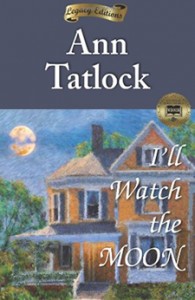I’ll Watch the Moon Discussion Questions
1. Nova, narrating the story, calls it a “love story” but not a “romance” and insists there is a difference. What is the difference? Which would you rather read? Which would you rather have in your own life?
2. The Tierney family eventually takes to heart a Jewish parable about a rabbi on a hill who, upon seeing tragedy, wishes to be God, not so he can change the events, but so he can understand them. How does this parable come to comfort the Tierneys? Are there events in your own life that seem beyond anything but celestial comprehension?
3. With which character’s faith did you most relate? Which do you desire?
Nova’s innocent pondering?
Aunt Dortha’s steadfast belief in Providence?
Catherine’s anger and frustration?
Dewey’s rational exploration of God through creation?
Josef’s deep and mature faith?
4. Dewey sees God in the cosmos. Where do you find wonder in God’s presence? How did Dewey’s love of the stars and the moon rub off on his younger sister?
5. Throughout the book Nova is constantly on the lookout for a father. How does her family, as it is, shape her young life? In the end she has a chance to add closure to the loss of her birth father. Do you think she would have been on such a search if closure had happened earlier? How does her search for a father mirror her trying to understand God’s place in the world?
6. Much of the heart of I’ll Watch the Moon is about the different ways in which people deal with true pain, suffering, and loss in their lives. If you feel comfortable, think about or discuss a situation in your own life. What approach did you take? What are other options besides Catherine’s anger and Josef’s solemn acceptance? How can you offer hope to others who may be struggling with deep grief?
7. Viktor E. Frankl, a Holocaust survivor and esteemed Jewish psychiatrist, said this in his bestselling book Man’s Search for Meaning: “There is nothing in the world, I venture to say, that would so effectively help one to survive even the worst conditions as the knowledge that there is a meaning in one’s life.” How does this inform Josef Karski’s life? Do you agree with the statement? Are there things too great for even hope to overcome?
8. Nova remembers the night her brother got sick and says that even small moments can divide your life into “before and after.” Can you think of a dividing moment—good or bad—in your own life? How clear and memorable is that moment? Why do those moments stay with us for so long?
9. Epidemics like polio and Spanish flu also play a large part in the book. What is so terrifying about an epidemic? How do we live now in the face of potentially deadly epidemics—spread either by nature or by man?
10. Discuss the character of Mr. Diehl. What is his defining characteristic? What does he have in common with the 1937 Chevrolet pickup truck he gives to Catherine?
11. The miracle of the dimes is Nova’s first interaction, personally, with God. What is the miracle? What do you think of Josef’s statement: “Providence prefers small blessings to large miracles”? Do you think that is true? Have you experienced either one? Why does it seem that large miracles occurred more frequently in biblical times than they do now?
12. The name “Providence” is substituted for God on numerous occasions by both Aunt Dortha and Josef. Do you think of God as “providential?” What does it mean, or how does it change your life, to believe in a God who always knows what is about to happen?
13. In the descriptions of Josef’s time in the prison camps he talks about the muselman—the walking dead. Are there people in your life who fit that description now? How do we not live life like muselmen, but instead live with hope and purpose?
14. Talk about Catherine’s turn from anger. Who is most influential in that change? When she speaks at Josef’s funeral about his saving her, she means both literally and figuratively. What do you think he sacrificed, even before he died in the snowstorm, by reliving his tragic life in his late-night talks with her?
15. Josef’s death hearkens to the ending of the classic Leo Tolstoy story Master and Man. If you have time, read that story (available for free online) and discuss the similarities and differences between Josef and Tolstoy’s “master,” Vasili Andreevich.


